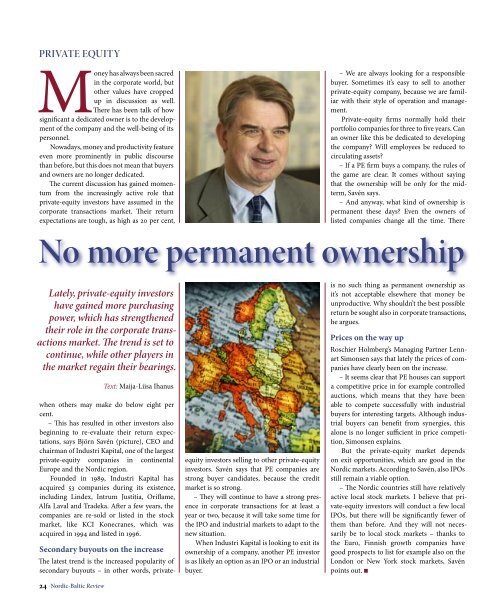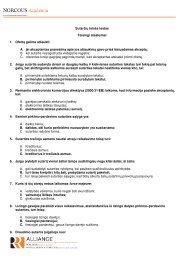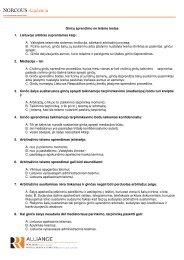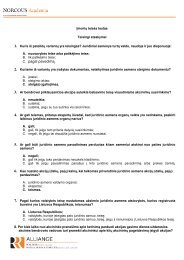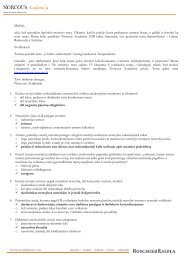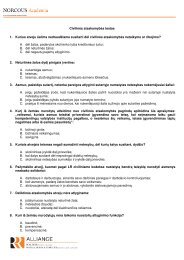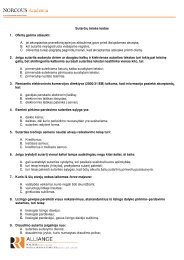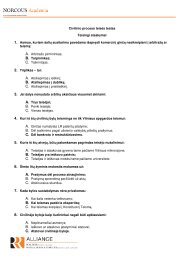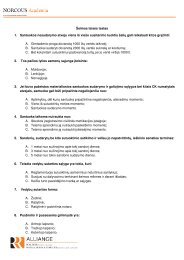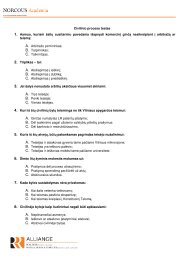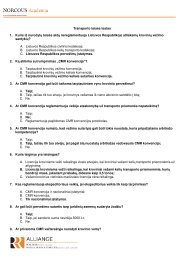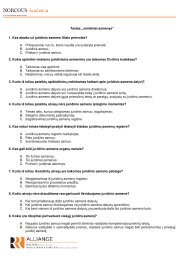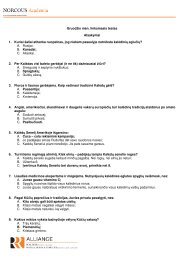Nordic-Baltic Review - NORCOUS Academia
Nordic-Baltic Review - NORCOUS Academia
Nordic-Baltic Review - NORCOUS Academia
Create successful ePaper yourself
Turn your PDF publications into a flip-book with our unique Google optimized e-Paper software.
PRIVATE EQUITY<br />
Money has always been sacred<br />
in the corporate world, but<br />
other values have cropped<br />
up in discussion as well.<br />
There has been talk of how<br />
significant a dedicated owner is to the development<br />
of the company and the well-being of its<br />
personnel.<br />
Nowadays, money and productivity feature<br />
even more prominently in public discourse<br />
than before, but this does not mean that buyers<br />
and owners are no longer dedicated.<br />
The current discussion has gained momentum<br />
from the increasingly active role that<br />
private-equity investors have assumed in the<br />
corporate transactions market. Their return<br />
expectations are tough, as high as 20 per cent,<br />
– We are always looking for a responsible<br />
buyer. Sometimes it’s easy to sell to another<br />
private-equity company, because we are familiar<br />
with their style of operation and management.<br />
Private-equity firms normally hold their<br />
portfolio companies for three to five years. Can<br />
an owner like this be dedicated to developing<br />
the company Will employees be reduced to<br />
circulating assets<br />
– If a PE firm buys a company, the rules of<br />
the game are clear. It comes without saying<br />
that the ownership will be only for the midterm,<br />
Savén says.<br />
– And anyway, what kind of ownership is<br />
permanent these days Even the owners of<br />
listed companies change all the time. There<br />
No more permanent ownership<br />
Lately, private-equity investors<br />
have gained more purchasing<br />
power, which has strengthened<br />
their role in the corporate transactions<br />
market. The trend is set to<br />
continue, while other players in<br />
the market regain their bearings.<br />
when others may make do below eight per<br />
cent.<br />
– This has resulted in other investors also<br />
beginning to re-evaluate their return expectations,<br />
says Björn Savén (picture), CEO and<br />
chairman of Industri Kapital, one of the largest<br />
private-equity companies in continental<br />
Europe and the <strong>Nordic</strong> region.<br />
Founded in 1989, Industri Kapital has<br />
acquired 53 companies during its existence,<br />
including Lindex, Intrum Justitia, Oriflame,<br />
Alfa Laval and Tradeka. After a few years, the<br />
companies are re-sold or listed in the stock<br />
market, like KCI Konecranes, which was<br />
acquired in 1994 and listed in 1996.<br />
24 <strong>Nordic</strong>-<strong>Baltic</strong> <strong>Review</strong><br />
Text: Maija-Liisa Ihanus<br />
Secondary buyouts on the increase<br />
The latest trend is the increased popularity of<br />
secondary buyouts – in other words, privateequity<br />
investors selling to other private-equity<br />
investors. Savén says that PE companies are<br />
strong buyer candidates, because the credit<br />
market is so strong.<br />
– They will continue to have a strong presence<br />
in corporate transactions for at least a<br />
year or two, because it will take some time for<br />
the IPO and industrial markets to adapt to the<br />
new situation.<br />
When Industri Kapital is looking to exit its<br />
ownership of a company, another PE investor<br />
is as likely an option as an IPO or an industrial<br />
buyer.<br />
is no such thing as permanent ownership as<br />
it’s not acceptable elsewhere that money be<br />
unproductive. Why shouldn’t the best possible<br />
return be sought also in corporate transactions,<br />
he argues.<br />
Prices on the way up<br />
Roschier Holmberg’s Managing Partner Lennart<br />
Simonsen says that lately the prices of companies<br />
have clearly been on the increase.<br />
– It seems clear that PE houses can support<br />
a competitive price in for example controlled<br />
auctions, which means that they have been<br />
able to compete successfully with industrial<br />
buyers for interesting targets. Although industrial<br />
buyers can benefit from synergies, this<br />
alone is no longer sufficient in price competition,<br />
Simonsen explains.<br />
But the private-equity market depends<br />
on exit opportunities, which are good in the<br />
<strong>Nordic</strong> markets. According to Savén, also IPOs<br />
still remain a viable option.<br />
– The <strong>Nordic</strong> countries still have relatively<br />
active local stock markets. I believe that private-equity<br />
investors will conduct a few local<br />
IPOs, but there will be significantly fewer of<br />
them than before. And they will not necessarily<br />
be to local stock markets – thanks to<br />
the Euro, Finnish growth companies have<br />
good prospects to list for example also on the<br />
London or New York stock markets, Savén<br />
points out. ■


